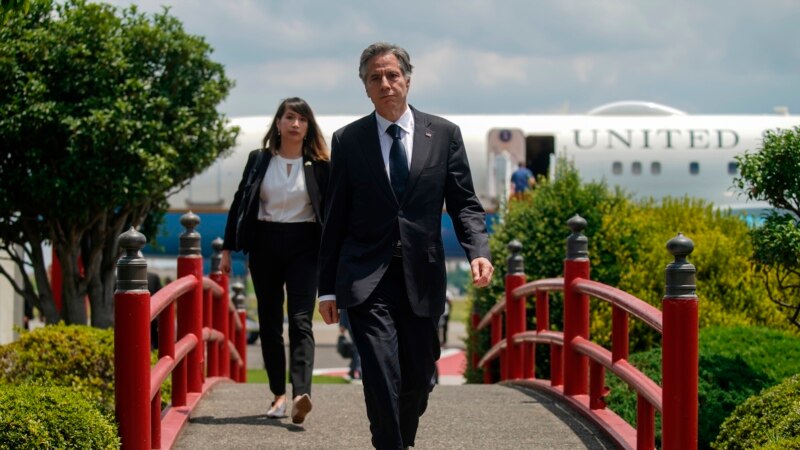
U.S. Secretary of State Antony Blinken expressed condolences during a visit Monday to Tokyo following the assassination of former Prime Minister Shinzo Abe.
“I shared with our Japanese colleagues the sense of loss, the sense of shock that we all feel, the American people feel, at this horrific tragedy and killing,” Blinken told reporters after meeting with Prime Minister Fumio Kishida. “It’s such a loss too because during his time in office Prime Minister Abe really took the relationship between our countries to new heights.”
Abe was killed Friday in the city of Nara as he made a campaign speech.
Blinken said he went to Japan at the direction of U.S. President Joe Biden, “because more than allies, we’re friends.”
“And when a friend is hurting, other friends show up. We try to help ease the burden, share the sense of loss, give a shoulder, and that’s what we’re trying to do today,” Blinken said.
Myanmar repression
Sunday, Blinken condemned repression by Myanmar’s junta while urging China and a Southeast Asian bloc of nations to pressure Myanmar’s military rulers to restore democracy and adhere to a peace deal it agreed to last year.
“I think it’s … incumbent upon China and in China’s interests to see Burma move back to the path that it was on before it was so violently disrupted by the coup,” Blinken said, using Myanmar’s former name.
He said at a Bangkok news conference that despite last year’s “five-point consensus” peace agreement developed by the Association of Southeast Asian Nations, or ASEAN, which includes Myanmar, “There has been no positive movement on that.”
In April of last year, ASEAN’s nine other countries and Myanmar junta chief Min Aung Hlaing signed an agreement that included immediate cessation of violence and continued talks among all parties.
“The ASEAN countries need to hold the regime accountable for that … continue to demand the cessation of violence and release of prisoners,” Blinken said.
But instead, the top U.S diplomat said, “I think it’s unfortunately safe to say that we’ve seen no positive movement and on the contrary, we continue to see the repression of the Burmese people, we continue to see violence perpetrated on them by the regime, we continue to see virtually the entire opposition in jail or in exile.”
“And we continue to see a terrible humanitarian situation exacerbated by the fact that the regime is not delivering what’s necessary for the people,” Blinken added.
He said, “All countries have to continue to speak clearly about what the regime is doing, and its ongoing repression and brutality. We have an obligation to the people of Burma to hold the regime accountable.”
Blinken, on a tour of Asian countries, met with Thailand’s Deputy Prime Minister and Foreign Minister Don Pramudwinai. They signed a communique on the countries’ strategic alliance and partnership, and then a memorandum of understanding on promoting supply chain resilience between Thailand and the United States.
Ties ‘will grow stronger’
Speaking to reporters afterward, Blinken said, “Our countries share the same goal of a free open, interconnected prosperous, resilient and secure Indo-Pacific. In recent years, we worked together even more closely toward that vision. Our economic ties are incredibly strong and even now emerging from COVID. They will grow stronger.”
Blinken arrived in Thailand a few days after his Chinese counterpart, Foreign Minister Wang Yi, who was on his own tour of Southeast Asia. Over the weekend, Wang visited Myanmar, his first visit to the country since the military seized power last year.
Blinken and Wang met Saturday at the summit of the Group of 20 largest economies, or G-20, in Bali, Indonesia, and spoke for several hours.
The top U.S. diplomat told his Chinese counterpart during those meetings that China’s support for Russia’s war in Ukraine is complicating U.S.-Chinese relations at a time when they are already beset by rifts and enmity over numerous other issues.
Wang blamed the U.S. for the downturn in relations and said American policy has been derailed by what he called a misperception of China as a threat.
“Many people believe that the United States is suffering from a China-phobia,” the Chinese foreign minister said, according to a Chinese statement. “If such threat-expansion is allowed to grow, U.S. policy toward China will be a dead end with no way out.”
Blinken said he conveyed “the deep concerns of the United States regarding Beijing’s increasingly provocative rhetoric and activity toward Taiwan.” Blinken said he also addressed U.S. concerns over Beijing’s attempt at controlling the strategic South China Sea, repression of freedom for residents in Hong Kong, and the treatment of ethnic and religious minorities, including Uyghurs in Xinjiang.
Talk of more cooperation
Additionally, the U.S. secretary of state said that he and Wang discussed ways in which there could be more cooperation between the two countries in areas such as climate crisis, food security, global health, and the fight against drug trafficking.
For his part, Wang said China and the United States need to work together to ensure that their relationship will continue to move forward along the right track.
